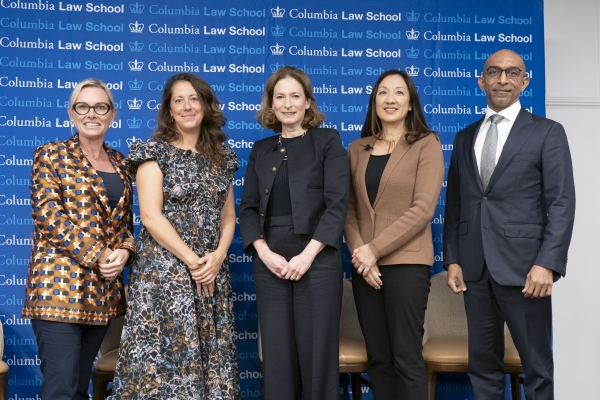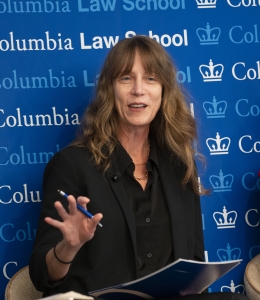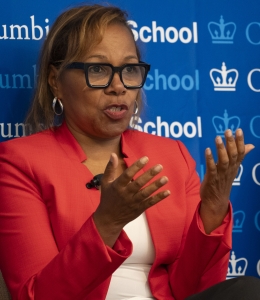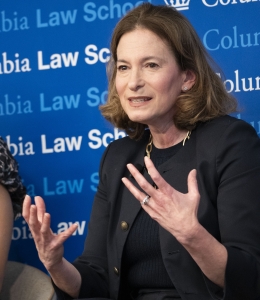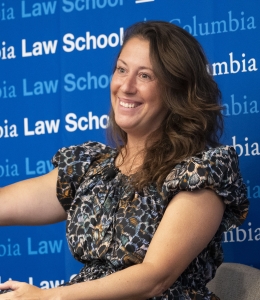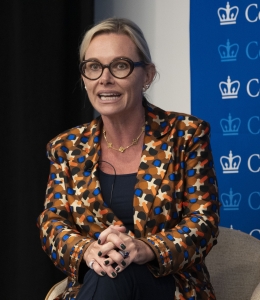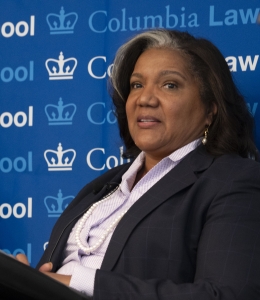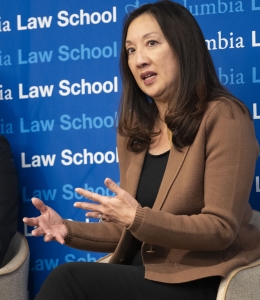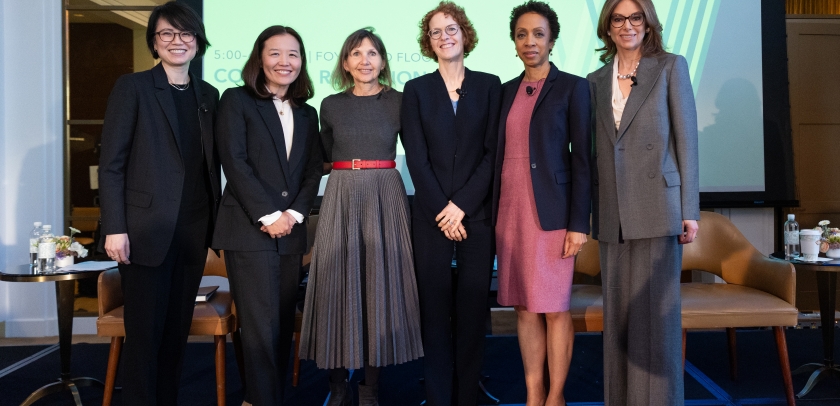Capital Connections for the Women of Columbia Law
The initiative’s latest event, held in Washington, D.C., highlighted the “now and next.”
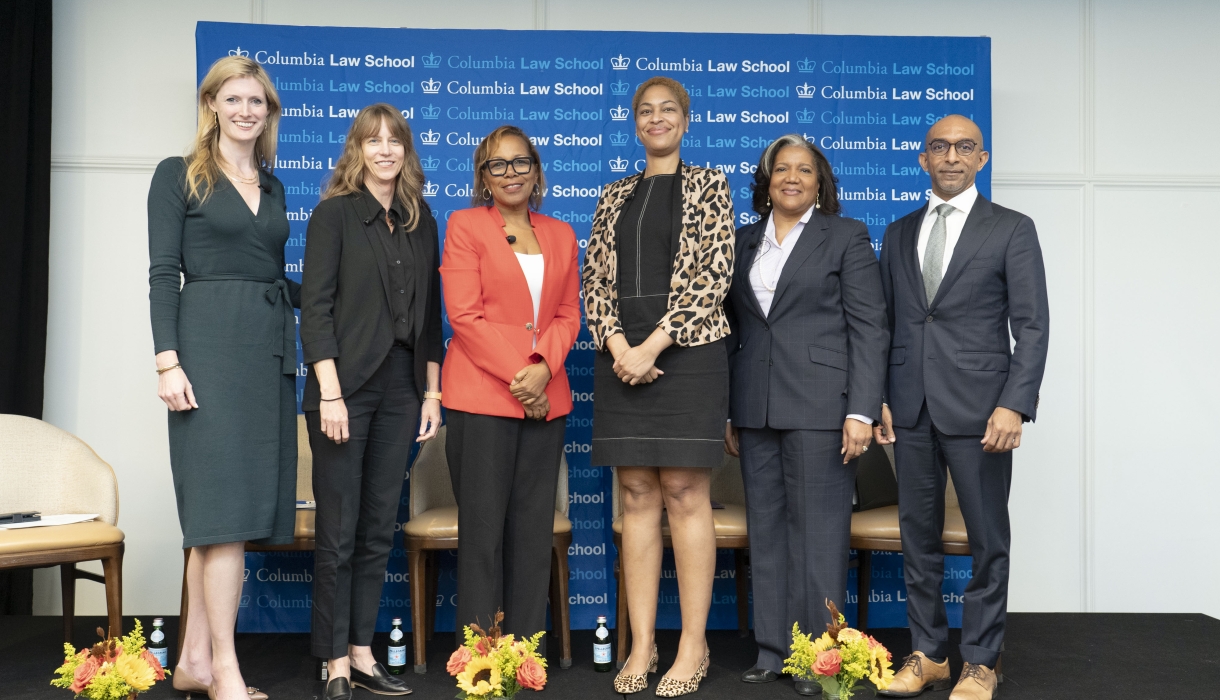
From left to right: Alexandra Reeve Givens ’08, Gretchen Borchelt ’02, Judith Browne Dianis ’92, Andrea McChristian ’13, Cynthia Quarterman ’87, and Dean Daniel Abebe.
The Women of Columbia Law initiative—designed to bring together an intergenerational community of Columbia Law alumnae to learn, network, and engage on topics of common interest—held its latest event in Washington, D.C., on October 24. The gathering of alumni and friends at The Darcy Hotel featured discussions on careers in nonprofit legal advocacy and on leadership and mentoring.
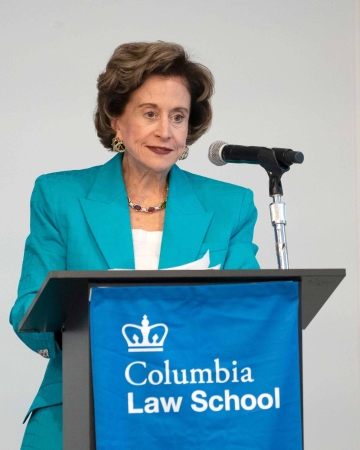
Annette L. Nazareth ’81, senior counsel at Davis Polk & Wardwell and a member of the Law School’s Board of Visitors, welcomed attendees, noting that despite the considerable strides women have made in the law, gatherings like the Washington event are both necessary and urgent. “Women need to exchange insights, cultivate networks, and collaborate to ensure our presence and influence is felt everywhere that decisions are made,” she said.
The D.C. event was the third in a series that started in October 2023 on Columbia’s campus and also traveled to the West Coast in spring 2024.
“An important goal of this initiative is to highlight what is now and what is next for the women of Columbia Law,” said Daniel Abebe, Dean and Lucy G. Moses Professor of Law, in his opening remarks. The series, he added, provides Columbia Law alumnae “the opportunity to come together to celebrate the past while also recognizing the pivotal role that so many of you play in tackling the very real and persistent challenges faced by women across the legal profession—and society—today.”
In addition to referencing several of Columbia Law’s notable alumnae—including Ruth Bader Ginsburg ’59, Constance Baker Motley ’46, and Bella Abzug ’45—Dean Abebe also recognized four women who sought to enroll before the Law School began accepting female students in 1927: Inez Milholland, Florence Rauch, Evelyn Tobey, and Mary Bradford Peaks.
“What might they say in hearing that 56% of our J.D. Class of 2027, which began law school this fall, is composed of women?” he asked.
Future regional gatherings are currently being planned, including an event in San Francisco in March 2025, to bring the Women of Columbia Law initiative to additional areas of the country.
Read more about each panel below:
“Beyond the Ballot”
Nonprofit leaders discussed critical challenges posed by mis- and disinformation and its impact on public trust and civic engagement. Moderated by Alexandra Reeve Givens ’08, president and CEO of the Center for Democracy & Technology, the panel included Gretchen Borchelt ’02, vice president for reproductive rights and health at the National Women's Law Center; Judith Browne Dianis ’92, executive director of Advancement Project; Andrea McChristian ’13, policy research director at the Southern Poverty Law Center; and Cynthia Quarterman ’87, distinguished fellow with the Global Energy Center at the Atlantic Council.
“Grace Rodriguez ’86 Leadership Panel”
The event also featured the inaugural Grace Rodriguez ’86 Leadership Panel, named in remembrance of the Columbia Law alumna and longtime partner at King & Spalding. Alicia O’Brien, a partner at King & Spalding, introduced the panel and praised Rodriguez as smart, compassionate, “gutsy,” and a role model for her colleagues. “She heard you, she saw you, and she thought of ways she could help you,” O’Brien said. “Even though she was always the smartest in the room, she never made you feel that way. Quite the opposite: She lifted people up.” During the conversation, moderated by Delphine O’Rourke ’01, CEO of 8Fold Inc., panelists shared insights on leadership, mentorship, and career paths. Participants included Lori Alvino McGill CC ’99, LAW ’03, adjunct faculty member at the University of Virginia School of Law; Jennifer Klein ’90, assistant to the President and director of the White House Gender Policy Council; and Simone Wu ’89, senior vice president, general counsel, corporate secretary and external affairs for Choice Hotels International.
